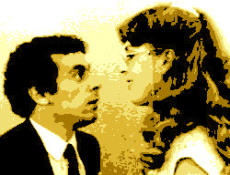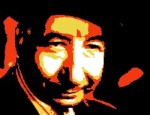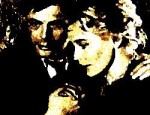Film Review
Unlike many French sex comedies of the late '70s, early '80s, which were
little more than tacky exploitation films that lazily drape fatuous gags
over a super-abundance of casual female nudity,
Le Roi des cons was
a fairly honest attempt to reflect the changes in French society resulting
from the sexual revolution - not just society's attitudes towards sex, but
how male and female relationships were changing as the movement for female
emancipation gathered momentum. It's not a particularly profound or
insightful film, it isn't even a great comedy (most of the gags are pretty
lame) but it touches a nerve that few films of its ilk did, and this accounts
not only for the success it had on its original release (it attracted an
audience of 1.9 million) but also its enduring popularity.
Le Roi des cons is more
a time capsule than a piece of cinema.
The film takes its title and subject matter from a well-known strip cartoon
by the legendary French cartoon artist Georges Wolinski. Much of Wolinski's
work was published in the satirical weekly newspaper
Charlie Hebdo
- indeed it was at the Paris offices of this paper that the artist met his
tragic end, one of the eight members on the payroll of
Charlie Hebdo
to be assassinated by jihadist terrorists in January 2015. Wolinski's
quirky view of life, his irreverence and mischievous sense of fun, moreover
his ability to see things more clearly than most and express this through
humour - all this is reflected in the film, which was scripted and directed
(with more brio than skill) by Claude Confortès.
Happy to be cast in the title role is Francis Perrin, an actor who, at this
point in his career, was invariably called upon to play the timid romantic,
not least in the films that he would subsequently direct himself, beginning
with
Tête à claques
(1982). Perrin's overpowering personality leaves little space for his
co-stars and this may have been the reason why he was far more successful
on stage than in films. In
Le Roi des cons, he is well-suited
to play a likeable no-hoper, whose only talent is a capacity to charm the
ladies into his bed with his silver tongue. With a bevy of beauties
that includes Marie-Christine Descouard, Bernadette Lafont, Évelyne
Buyle and Fanny Cottençon, poor Mr Perrin hasn't much time left for
anything but bed-hopping. Still, he somehow manages to find the time
to go around Paris dressed like Peter Falk's Columbo, to quiz passersby on
their sexual habits. Cue a stream of predictable but very funny gags.
Despite Perrin's apparent willingness to take off all of his clothes
at the top of a hat, he never made it as a porn star. We should be
grateful for small mercies.
In addition to a supporting cast that includes many well-known actors of
the period (Roland Giraud, Luis Rego, Michel Aumont, Jean-Marc Thibault),
the film includes numerous cameo appearances from a whole host of talented
individuals - some appearing in front of the movie camera for the first time.
These include the playwright Eugène Ionesco, set designer Alexandre
Trauner, film director Claude Berri, and several members of the staff of
Charlie Hebdo, including our friend Georges Wolinski (in the guise
of a taxi driver). Putting names to these half-recognised faces is
one of the film's main pleasures.
© James Travers 2016
The above content is owned by frenchfilms.org and must not be copied.
Film Synopsis
Georges Le Roi may be a loser who can't hold down a job for more than a few
days, but when it comes to attracting the opposite sex he is the King of
the Casanovas. No female, it seems, can resist this mild-mannered 30-something.
Even though he already has an active love life with his two existing girlfriends,
Georges cannot help falling for Sophie, who works for a polling agency.
Impressed by Georges's way with words, Sophie hires him as a pollster, before
taking him as her lover. One night, Sophie records Georges's declarations
of love on a cassette tape, which then gets broadcast by mistake throughout
her offices. Everyone who hears the tape is enraptured by it, and this
gives Sophie an idea to exploit Georges's unique talents...
© James Travers
The above content is owned by frenchfilms.org and must not be copied.



